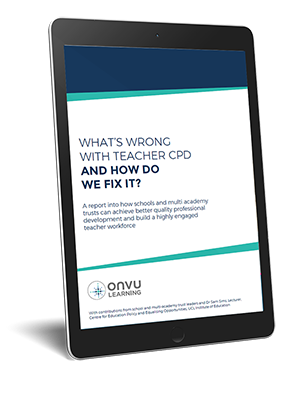- Lesson Observation
- 4 Minute Read



In 1949, George Orwell’s dystopian novel introduced the world to the grim spectre of being under constant surveillance by the authorities. The story has since inspired various interpretations of ‘Big Brother’, which in schooling can be most apparent when considering teacher observations.
Lesson observations and their current equivalents share the same difficulties of synchronicity, validity, and disruption and increasingly schools seek alternatives to gaining insight into what it is like learning in that classroom. As schools increasingly turn to technology to enhance insights into classroom experiences, one method stands out: introducing cameras for the classroom.
But does the introduction of cameras into classrooms really mean that Big Brother is going to be watching teachers?
In schools, it is likely that the ‘big brother’ concern stems from:
None of those sources of concern are unreasonable per se but they can create unreasonable barriers to teacher-centric self-improvement.
Schools have for too long been driven by a desire to prove something that is inherently difficult to prove: causality between teaching and learning (particularly on an individual basis). As such, it's not entirely surprising that some teachers and leaders might make the link between their lived experience and an authoritarian with time on their hands to watch footage.
So much of what we talk about when discussing ONVU Learning with school leaders and teachers boils down to how much trust and confidence exists in and around the school(s). Does the headteacher make it their business to encourage or to interfere? Do teachers get provided the tools to be amazing or simply to do more? Is teacher continuous professional development (CPD), which ONVU Learning is designed to underpin, valued across the board as the most sustainable means to improving students’ outcomes and so encouraged, not just viewed as a tick box exercise?
I think that the challenge is how to balance accountability with the professional autonomy of teachers without fostering a culture of perceived or real mistrust. This issue is particularly in the spotlight when discussing cameras in the classroom because it raises questions about the extent and purpose of them.
In Sam Sims’ recent blog: A proposal for saving five million hours per year (one day per teacher) of workload, without harming pupil achievement. He suggests that the sector could save a lot of hours by not performing data drops unnecessarily and so makes a compelling case for leaders to better question how they direct their teachers’ time. At ONVU Learning, we echo that call and encourage school leaders to invest that saved time into more meaningful teacher personal professional development and enabling teachers to become more able to influence their own destiny. By giving teachers agency over their CPD and control over how they measure the impact of what they choose to practice, teachers will then adopt into their practice the things that really work for them.
Video lesson capture has been around for a while now – mostly involving teachers setting up ad hoc specific video recording devices (like a smartphone or tablet) for the purpose of recording a specific and pre-planned learning activity or lesson.
At ONVU Learning, we propose and offer the opportunity for teachers to review classroom video recordings made using our fixed-position 360-degree cameras. The specific cameras we use are discreet but not hidden. We promote this style of video classroom capture because it removes the hassle of setting up equipment, makes the learning activity being recorded more natural, and enables a (re)view of teaching and learning rather than focusing in on what you hoped to see all along or only the teacher at whom the camera is pointed. The nature of the technology captures the entire classroom wherever the teacher or students may be.
The question remains: does the benefit of using video capture technology in classrooms justify the concerns about surveillance? While the shadow of Orwell’s 1984 looms large, it is crucial to distinguish between using technology for support versus surveillance. Or through a teacher’s eyes, is this a tool that will help or harm me?
The difficulty is that when a teacher or school leader asks me about whether using ONVU Learning is ‘a bit Big Brother’, my first thought goes to who ‘Big Brother’ is in that scenario. Is it me? Is it them, their colleagues or their headteacher sat in their office watching screen upon screen? Is it someone unnamed and unknown? No, to all the above. My immediate second thought is more focused in that whoever ‘they’ maybe, our technology does not enable this kind of Orwellian system.
“Our first thought goes to who ‘Big Brother is. Our second thought is whoever ‘they’ maybe, our technology does not enable this kind of Orwellian system.”
ONVU Learning puts teachers in the driver's seat by giving them control over the video footage they choose to share. It's mostly used for self-reflection, so when it comes to things like coaching or lesson observations, teachers get to pick which parts of their lessons they want to show. This approach helps in making them feel comfortable in the whole observation process and trusted as professionals.
In the UK and many places around the World we face a shortage of teachers to work in our schools. This has many causes that we will not explore now but amongst the solutions to poor teacher recruitment (as a sector) and retention (again) must involve genuinely empowering teachers to be the best version of themselves. This means encouraging personal professional growth through curiosity from an established, valid base (i.e. teachers are professionally trained university graduates). It also means providing teachers with reliable and trustworthy tools to enable them to do better on their terms, in their context and given the available support that exists to guide (not direct) them.
If teachers were treated more like the professional, vocationally driven experts that they start as and provided tools to help them play, practice, self- and co-reflect, and perform then we have little doubt that our teacher workforce would be happier, stay longer and become ever more effective at delivering for students the outcomes that they deserve.
I hope I have dispelled any 'Big Brother' fears about how ONVU Learning camera technology is introduced and used in classrooms. Teachers are the backbone of our educational systems, and they deserve access to tools that respect their professionalism and genuinely empower them without compromising their privacy or autonomy. Leaders need to understand change from their teachers’ perspective to enable sustainable improvements to take root.
Further reading:
Check out our compelling 'Improvement through Empowerment' blog series:
Part 1: Transforming Lesson Observations
Part 2: Personalising CPD (Continuing Professional Development) in Schools
Part 3: Boosting School Performance with Tailored Support
Educational Guide: Cameras in the Classroom provides further details on how camera technology benefits the classroom learning experience?

An insightful and informative report exploring how schools and multi academy trusts can achieve quality professional development and build a highly engaged teacher workforce.
With contributions from influential education leaders, it’s a read you won't want to miss.
KEEP IN TOUCH WITH ONVU LEARNING AND BE THE FIRST TO RECEIVE THE LATEST NEWS AND INSIGHTS ON EDTECH, LESSON OBSERVATION, TEACHER TRAINING AND DEVELOPMENT.